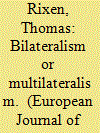| Srl | Item |
| 1 |
ID:
101377


|
|
|
|
|
| Publication |
2010.
|
| Summary/Abstract |
Why do states cooperate bilaterally or multilaterally? This article addresses the issue using the example of international double tax avoidance. It is argued that double tax avoidance exhibits the strategic structure of a coordination game with a distributive conflict. The distribution of tax revenues depends on the asymmetry of investment flows between treaty partners. Since investment flows are defined dyadically, bilateral bargaining can best accommodate countries' concerns for the distribution of tax revenues and other economic benefits connected to the tax base. Moreover, because there are no serious externality problems with bilateral agreement, this solution is also viable. At the same time, there is a need for a multilateral organization to disseminate information and shared practices in the form of a model convention that provides a focal point for bilateral negotiations. This solution minimizes transaction costs. Since agreements are self-enforcing in coordination games there is no need for third-party enforcement. Instead, the Mutual Agreement Procedure (MAP) is a device to address problems of incomplete contracting.
|
|
|
|
|
|
|
|
|
|
|
|
|
|
|
|
| 2 |
ID:
155773


|
|
|
|
|
| Summary/Abstract |
This article presents and examines a model of legalization on an original dataset of informal Canadian–US defence and security arrangements (DSA) formed between 1955 and 2005. Non-treaty arrangements permit US presidents to bypass Senate ratification, resulting in expediency and secrecy, both assets in defence and security relations. That withstanding, informal arrangements contain provisions responding to certain strategic problems. They detail aspects of legalization: delegation; obligations; and precision. Leaders select informal arrangements to incur fewer public commitments, but design them to ensure credibility. In that context, what factors shape informal DSA legalization? Propositions developed from delegation and rational institutionalist arguments identify the factors influencing informal DSA legalization. The Canada–US case is germane due to its “rules-based” nature and heterogeneity. An original dataset of the legal design of eighty-two bilateral DSA is introduced and analyzed. Results confirm cabinet shuffles and unified governments decrease DSA legalization while Democrat presidents and rising military threats increase it.
|
|
|
|
|
|
|
|
|
|
|
|
|
|
|
|